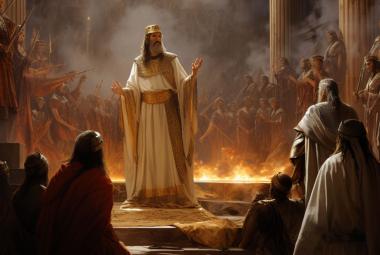As discussed last month, the New Apostolic Reformation (NAR) has been dubbed the “largest religious movement you never heard of,”1 and David Barret, author of World Christian Encyclopedia, indicates that “Not only is the New Apostolic Re-formation the largest of the four non-Catholic megablocks, but significantly, it is the only one of all five megablocks that is growing faster than Islam.”2 [Emphasis mine]
Bolstered by the conviction that they have an “urgent man-date from God to actively engage in transforming society,”3 it is not likely that they will just fade away if ignored.
The Great Commission Redefined
C. Peter Wagner, the founder of the New Apostolic Reformation, and many others involved, think that many Bible scholars through church history have misunderstood the great commission of Matthew 28:
Go ye therefore, and teach all nations, baptizing them in the name of the Father, and of the Son, and of the Holy Ghost: Teaching them to observe all things whatsoever I have commanded you:
Matthew 28:19-20 (KJV)
C. Peter Wagner believes it is not about making disciples of individuals. It’s about transforming nations and societies from the top down at a national level, through the seven mountains which he refers to as “seven supreme molders of culture—namely religion, family, government, arts and entertainment, media, business, and education.”4 He has taken one definition of the English word “nation” that references a social entity including the political system and the territory it occupies, and has ignored the definition of a multitude or group of individuals that make up an ethincity. Even then, his definition is only viable in English, if the word is taken out of the context of the Matthew passage.
The Greek word εθνος (ethnos), refers to the individual people who make up the nation and is where we get the English word ethnicity. The Blue Letter Bible gives the primary meanings as “a multitude (whether of men or of beasts) associated or living together as in a company, troop, or swarm. A multitude of individuals of the same nature or genus such as the human family.”5
So in this passage, “nation” does not refer to a social entity, but the individuals who make up the society.
A better translation of the word “teach” in this passage is “disciple” since the Greek word is actually μαθητεÏω (mathÄ“teuÅ), which means to “make disciples” by teaching and instructing them. How would you make a disciple of a nation as a single entity? Additionally, reading this passage in con-text, it continues: “Baptizing them in the name of the Father, and of the Son, and of the Holy Ghost.” How would you baptize a nation? In context, it is clearly speaking of the individuals that make up a national group.
The International Standard Version (ISV) gives a translation of this Scripture passage which is an excellent representation of the actual meaning of the Greek text:
Therefore, as you go, disciple people in all nations, baptizing them in the name of the Father, and the Son, and the Holy Spirit, teaching them to obey everything that I’ve commanded you…6
Matthew 28:19-20 (ISV)
Strategic Spiritual Warfare
C. Peter Wagner teaches that there are three levels of spiritual warfare:
1. Ground level spiritual warfare, which is casting out demons from individuals.
2. Occult level spiritual warfare, which is not confronting demons directly, but by dealing with the organized occultic activities that are found in Witchcraft, Voodoo, Wicca, etc.
3. Strategic level spiritual warfare, which is the highest level dealing with confrontation of territorial principalities that control entire communities, ethnic groups, religions, and nations.7
The third level, which is Strategic Level Spiritual Warfare, is one of the primary tools the NAR employs to achieve their perceived mandate to “disciple all nations” resulting in social trans-formation. They believe that the principalities and powers of darkness often take the form of territorial spirits who are as-signed to keep entire geographical areas, social spheres and cultural groups in bondage to evil.8
They appear to believe that there are demons for anything and everything. According to C. Peter Wagner, one such demon that needs to be cast out is “The Spirit of poverty, a demonic agent of Satan, intent on preventing the people from enjoying God-given prosperity.”9
C. Peter Wagner believes that since the early 1990s God has been promising a “great transfer of wealth” through his modern day (self-appointed) Apostles and Prophets. He is convinced that “a significant reason why we have not yet taken any of our cities for God is that we have not had enough money at our disposal.”10 He believes that the demon called “Mammon” is one of the highest ranking demonic powers to thwart Christians from shifting from poverty to prosperity and that he uses four subordinate demonic spirits in his attempt to entrap believers: The Spirits of Greed, Covetousness, Parsimony (stinginess) and Self-reliance. (Just to be clear, he isn’t speaking allegorically!)11
As indicated in last month’s article, this great transfer of wealth is planned to occur when the NAR takes over the “Mountain of Business.” In turn, this wealth obtained will be used primarily to conquer the “Mountain of Government,” along with the other five mountains.
A Government Controlled by the NAR?
C. Peter Wagner believes that the NAR can reach their goals through the Democratic process and he rejects the idea of a theocracy, which means “Rule by God.” His understanding of a theocracy is when the state or government owns and runs the churches such as implemented by Constantine, the Anglican Church, and Islam with the belief that those in power are put in place by “God” (whatever the definition) and ruling on his behalf.
He does not mention what he thinks about a “theonomy” as described by the Reconstructionists, which means “God’s Law” as in “the Law of God, or Biblical Law, as codified in the Old Testament should be instituted as the law of the United States and every nation on earth before the return of Christ.”12
In addition to rejecting a Theocracy, he also rejects the idea of the “Rule of the Church,” or Ecclesiastical rule, which would entail a church-run government—in other words, the church would actually be the government. Instead, C. Peter Wagner believes that “the best form of human government before Jesus returns is not theocracy, but democracy.13
In a democracy, while there is no established religion, religious people can be elected to office as freely as can non-religious people, and they can also rise to the highest and most influential positions in the other six non-governmental molders of culture.14 [The previously mentioned seven mountains.]
Taking dominion comes about by playing by the rules of the democratic game and, fairly and squarely, gaining the necessary influence in the seven molders of culture to ultimately benefit a nation…15
The rules of the democratic game opens the doors for Christians, as well as for non-Christians who have Kingdom values, to move into positions of leadership influential enough to shape the whole nation from top to bottom.16 [Emphasis mine]
The difference between this and the church being the government becomes a matter of semantics, because if the church or any religious organization took control over all the mountains of influence, it would amount to the same thing that he calls the “Rule of the Church”—the U.S. being governed by a church or a religious organization, in this case, the New Apostolic Reformation.
It is interesting that he includes “non-Christians who have Kingdom values.” It is doubtful that an unregenerated, unbeliever could have “Kingdom” values in the true sense of the word because as 1 Corinthians 2:13 states “the natural man receiveth not the things of the Spirit of God: for they are foolishness unto him: neither can he know them, because they are spiritually discerned.” Not to mention the fact that the Apostle Paul sternly warns against being unequally yoked with unbelievers. Could what C. Peter Wagner and the New Apostolic Reformation are describing be considered making (or some would say remaking) the U.S. a Christian Nation?
What Is the Definition of a “Christian” Nation?
The assertion that the U.S. was founded as a “Christian” nation has been proclaimed for many years. But what is the definition of a Christian nation, and do we really want the U.S. or any country in the world to be a so-called “Christian” Nation? Whose version of a “Christian” nation would we choose?
A Christian is a follower of Jesus Christ who believes that God came in the flesh, died for our sins, and rose again on the third day—a new creation, a child of God. A nation cannot actually be a “Christian” in the Scriptural sense. It is the individuals that make up a nation that are Christian.
If you ask a Roman Catholic, what would their definition of a “Christian” nation be? If you ask a Southern Baptist, a Lutheran, a Quaker, etc., would you get the same definition? What is the New Apostolic Reformation’s definition of a “Christian” nation? It is the Christians and Non-Christians with Kingdom values controlling the seven mountains of influence to mold the society into their version of God’s Kingdom on earth. Once they have control over these mountains, their self-appointed, mutually affirmed Apostles and Prophets will have authority over the rest of believers as the primary church government and their word will be taken as the Word of God.
Whose version of a “Christian” nation do we really want? Do we really want someone’s or some religious organization’s version of a Christian nation?
The true Kingdom of God, the Kingdom from Heaven, the fulfillment of the Davidic covenant, and the yet future Millennial Kingdom where the Messiah himself will rule with a rod of iron over the entire world, will be inaugurated by the Second Coming of the King of Kings and Lord of Lords.
Notes:
1. Berkowitz, Bill. 01 March 2010 Web. 8 October 2010. http://www.altnet.org/.
2. Wagner, C. Peter. Dominion! How Kingdom Action Can Change the Word. pg 23-24. Michigan: Chosen Books, 2008. Print.
3. Ibid. Pg 11.
4. Ibid. Pg 12.
5. “Ethnos” def. 1-2. Blue Letter Bible. Web. 7 November 2010. http://www.blueletterbible.org/lang/lexicon/lexicon.dfm?Strongs=G1484&t=KJV.
6. Giacumakis, George and William P. Welty. Editors. The International Standard Version. 10 Oct. 2010. Web. 11 Nov. 2010. http://www.isv.org.
7. Wagner, C. Peter. Dominion! How Kingdom Action Can Change the Word. pg 126-127. Michigan: Chosen Books, 2008.
8. Ibid. Pg 127.
9. Ibid. Pg. 185.
10. Ibid. Pg. 181.
11. Ibid. Pg. 190.
12. House, H. Wayne and Thomas Ice. Dominion Theology: Blessing or Curse? An Analysis of Christian Reconstructionism. Pg 27. Oregon: Multnomah Press, 1985.
13. Wagner, pg 14.
14. Ibid. Pg. 15.
15. Ibid. Pg. 18.
16. Ibid. Pg. 15.






